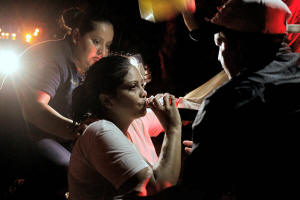|
The
caravan made up of mostly of women and children arrived earlier
in the day in the town of Acacoyagua, advancing 24 miles (38 km)
from a previous stop in another southern Mexican hamlet, just
beyond the border city of Tapachula, where the migrants began
their journey.
Migrants advocate Irineo Mujica, one of the caravan's leaders,
said migrants mostly rejected the offer of so-called
humanitarian visas from the agents in exchange for ending their
journey. The migrants also would have had to report to
government shelters and consent to be moved to other states,
Mujica said.
He added that many were distrustful of the migration officials
due to what he described as broken promises in the past, as well
as some arrests and deportations.
The humanitarian visas would have temporarily regularized the
migrants' legal status in Mexico while granting them access to
public services like healthcare, as well as the ability to work.
A press officer with the national migration institute said he
could not provide any information on negotiations over the
visas.
It remains unclear if the Mexican authorities will seek to break
up the caravan. Previous caravans have faced off with migration
agents and soldiers who have increasingly used tough tactics to
stem the tide of fleeing migrants, many of whom want to escape
violent gangs and grinding joblessness back home. Others are
seeking asylum protections.
The Mexican government is under pressure from U.S. authorities
to help reduce the flow and has deployed thousands of police and
national guard soldiers to do so in recent months.
(Reporting by Lizbeth Diaz in Mexico City; Additional reporting
by Jose Torres and Daniel Becerril in Acacoyagua; Writing by
David Alire Garcia; Editing by Stephen Coates)
[© 2021 Thomson Reuters. All rights
reserved.] Copyright 2021 Reuters. All rights reserved. This material may not be published,
broadcast, rewritten or redistributed.
Thompson Reuters is solely responsible for this content.

|
|




